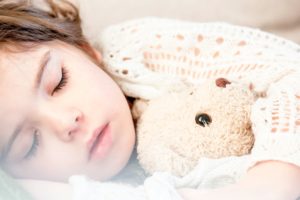Secondhand Smoke Linked to Childhood Sleep Apnea
November 20, 2021
 Sleep apnea is often perceived as a condition that affects older people, especially males. Although age and gender can play a role, anyone can develop sleep apnea—even children! Although enlarged tonsils and adenoids are often the culprits behind childhood sleep apnea, research shows there’s another risk factor. According to a study published in the International Journal of Pediatric Otorhinolaryngology, exposure to secondhand smoke increases the likeliness of developing a severe form of sleep apnea.
Sleep apnea is often perceived as a condition that affects older people, especially males. Although age and gender can play a role, anyone can develop sleep apnea—even children! Although enlarged tonsils and adenoids are often the culprits behind childhood sleep apnea, research shows there’s another risk factor. According to a study published in the International Journal of Pediatric Otorhinolaryngology, exposure to secondhand smoke increases the likeliness of developing a severe form of sleep apnea.
What is Obstructive Sleep Apnea?
Obstructive sleep apnea is a condition that causes frequent pauses in breathing from a narrowed airway. These interruptions can occur hundreds of times per night, with each event potentially lasting for a minute or more. If it sounds scary, it is.
Although the most common sign of the disorder is chronic snoring, the repeated lack of oxygen will strain their body. Not to mention, their sleep quality will be affected, which can influence their mood, behavior, development, and even learning.
Connection Between Secondhand Smoke and Sleep Apnea
We all know smoking is bad for your health, but research shows secondhand smoke can be just as harmful. Involuntary smoke inhaled from tobacco can lead to several health issues, like cardiovascular problems. Although the effects may not be apparent for many years, recent research has found a greater threat that’s often overlooked in children.
18 million adults in the U.S. have sleep apnea, but children aren’t immune to it. Only 4% of children have the breathing disorder. The recently published study found children 3 to 18 years of age exposed to secondhand smoke regularly were more likely to have sleep apnea. They also found the children had an increased likeliness for a severe form.
Although the exact link between the two isn’t known, it’s important to understand your child’s risk factors. Besides secondhand smoke, sleep apnea is connected to various conditions, including:
- Obesity
- Enlarges tonsils
- Small jaw
- Craniofacial syndromes
- Muscle weakness
- Down syndrome
Don’t Place Your Child at Risk
If you’ve noticed your child is snoring or breathing through their mouth, pay attention to their sleeping patterns. If they are sleepy during the day, it means they aren’t getting enough rest at night. Although sleep apnea may not be the cause, it’s important to have the condition ruled out.
The diagnostic process is simple and pain-free, even for young patients. A special device monitors their vitals while they sleep. Based on the results of the study, your physician will provide you with further instructions, such as recommending an oral appliance.
It’s important you take the necessary steps to relieve their symptoms, which may mean kicking the habit. You can ensure your child gets the rest they need by helping them breathe easier.
About Dr. Jacob Milner
Dr. Milner earned his dental degree at the University of Maryland School of Dentistry. He continued his training to focus on pediatric dentistry. He has also undergone advanced education in sleep medicine. He offers the solutions young patients need to relieve sleep apnea symptoms. Contact our office today to schedule an appointment for sleep apnea therapy.
No Comments
No comments yet.
RSS feed for comments on this post.
Sorry, the comment form is closed at this time.
